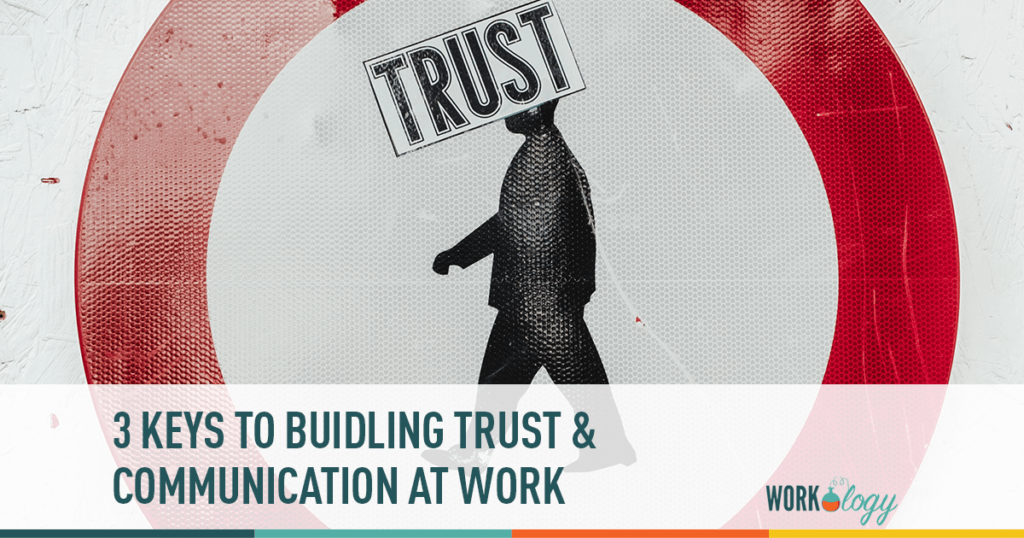I once had a friend from grad school say to me, “You’re pretty cool .. even though you work in HR.” Stunned and confused, I replied, “Um… I’m not sure what that means.” He went on to say, “We’ll I don’t like HR people. I just don’t trust them … or anyone in management.” All I could say, “WOW!” Do you know someone who thinks similarly? The likely answer is: Yes, even if they haven’t been as bold as my friend to say it to your face. According to the American Psychological Association’s 2014 Work and Well-Being Survey, “nearly 1 in 4 workers say they don’t trust their employer and only about half believe their employer is open and upfront with them.”
3 Keys to Buidling Trust & Communication at Work
Now whenever someone mentions “building trust” I get images of all the usual team building exercises running the gamut of everything from bowling to paintball, or doing trust falls and trust walks (which I personally hate because I almost always get injured), or coming up with a team charter and rules for respect. A team has an event and then check the box that trust has now been built — we had an afternoon of fun away from the office. Done and done. All those things are good and well intentioned — but do they really get to the heart of the matter and really build trust… and do they build trust at the right levels of the organization? I like those activities, and I don’t think that we should stop them, but I’m not convinced that they are the right answers when it comes to building trust. Effective communication is essential to building trust with your employees.
For me, trust needs to be built on an individual level with those closest to the employee and then actions and communications from leaders of departments and the organization need to be consistent with company values, mission, and vision statements. As an HR team member, its sometimes harder to influence the latter — but in the interest of our people, it is important work that we do and must pursue. However, we also have to ensure that we building trust with our employees and teams, and that is a little easier since you’re controlling your own actions and not influencing the actions of others. With a statistic that states only 50% of employees believe their employer is open and upfront with them, employees need to have someone in the org that they can go to and feel they have some level of trust with.
Best Practices for Communication at Work
Building trust through effective communication on an individual level not just at work, in my opinion, comes down to the following basic factors:
- Being likeable. When you think about people in your own life that you trust, are there any on the list that you don’t like? People tend to trust people who they like. I don’t that that means we’re talking about a popularity contest but being likable doesn’t hurt.
- Being relatable.Can people identify or relate to you? Do you strive to find the things that you have in common with people and use that to leverage or start a relationship? I have lots of different types of friends or people that I surround myself with who I would say I trust. They are not all carbon copies of me, but I can see ways that they like me whether it be that we majored in the same major, work in the same field, feed our dogs the same dog food, or love the same obscure sci-fi references. Its a factor that shows we have something in common and helps build a platform to increase trust.
- Keeping your word. Do you do what you say you are going to do? Plain and simple. If not,it might be impacting how people trust you.
- Tell you “they why.” To build high trust, people need to understand you why you do the things you do — your motives. Either they just get it (more likely with high trust – -they know you, how you think, and you’re consistent in that with actions and words) or they feel comfortable asking you why and can see how it is consistent with your actions and words. They understand your motives and those motives align with the other three bullets.
These are my basics for building trust with others on an individual level — what are yours? Any other trust basics to add?










One Comment
Also, a good practice to ensure that people trust you is to listen to them and show them that you understand them. A lot of people live their lives thinking that nobody really listen to them and understand their needs. So if you’re able to show to someone that you understand him/her, it will have a huge impact on your ability to positively influence them!
Comments are closed.